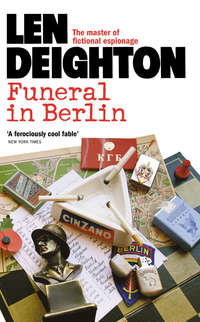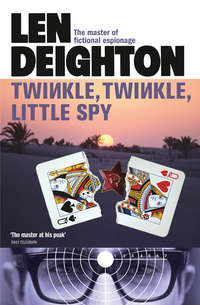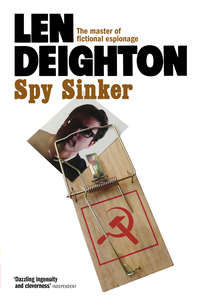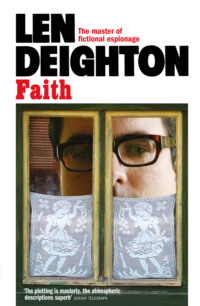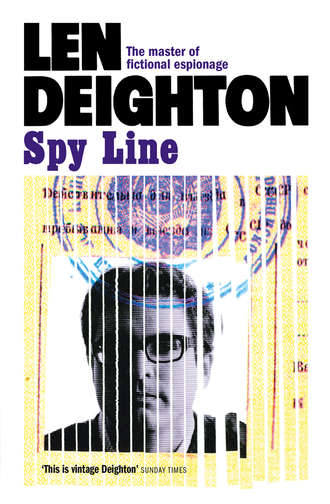
Полная версия
Spy Line
‘Well,’ I explained, ‘it’s your brother-in-law isn’t it?’
4
Some men are born hoteliers, others strive to acquire hotels, but Werner Volkmann was one of those rare birds who have a hotel thrust upon them. It would be difficult to imagine any man in the whole world less ready to become a hotel manager than my good friend Werner Volkmann. His dedication to Tante Lisl, the old woman who had brought him up when he was orphaned, compelled him to take over from her when she became too old and sick to continue her despotic reign.
It was not a sumptuous establishment but the neighbourhood could hardly be more central. Before the war it had been Lisl’s family home, set in the fashionable New West End. In 1945 the division of the city between the Russians and the Western Allies had made Der Neuer Westen the centre of ‘capitalist Berlin’.
Werner was making changes, but sensitive to Lisl’s feelings, for she was still in residence and monitored every new curtain and every drip of paint, the modifications did little to change the character of this appealing old place where so much of the interior was the same as it had been for fifty or more years.
After we left Lange Koby’s apartment that evening I let Werner persuade me to move in to his hotel. There was little reason to suffer the dirt and discomfort of my Kreuzberg slum now that Frank Harrington had demonstrated his office’s ability to put a finger out and reach me any time they chose.
Before going to bed Werner offered me a drink. We walked through the newly refurbished bar – there was no one else there – to the small office at the back. He poured me a big measure of scotch whisky with not much soda. Werner drank soda water with just a splash of Underberg in it. I looked around. An amazing transformation had taken place, especially pleasing for anyone who’d known Werner back in the old days. It had become a den and Werner’s treasures had miraculously resurfaced. There was a lion’s head: a moth-eaten old fellow upon whose wooden mounting some drunken wag had neatly inscribed felis leo venerabilis. Next to it on the wall hung an antique clock. It had a chipped wooden case upon the front panel of which a bucolic scene was unconvincingly depicted. It ticked loudly and was eight minutes slow but it was virtually the only thing he possessed which had belonged to his parents. Hanging from the ceiling there was the model Dornier flying boat that Werner had toiled so long to construct: twelve engines, and if you lifted up each and every cowling the engine detail could be seen inside. I remember Werner working on those tiny engines: he was in a vile temper for over a week.
We’d done no more than say how well Lange looked and what a fierce old devil he was when Ingrid Winter came into the room.
‘Bernie is staying here with us,’ Werner said rather more sadly than I would have hoped, but then Werner was like that.
Ingrid had come into the room without my noticing. ‘Oh, that’s good,’ she said. It would be easy to see Ingrid as a timid, self-effacing spinster, for she was always willing to appear in this guise. Her greying hair, which she did nothing to tint, her quiet voice and her style of floral-patterned woollen dresses all contributed to this picture. But even on our short acquaintance I’d discovered that Ingrid was a creature of fortitude and strength. Werner had discovered the same thing, and more, for the relationship between them was close. ‘That woman was here again,’ she told Werner in a voice tinged with disapproval.
‘The Duchess?’
‘The Englishwoman. The woman you said was a busybody.’
Werner looked at me and grinned self-consciously. ‘What did she want?’
‘The Duchess likes it here,’ I interjected. ‘She hopes it’s becoming a sort of club for the people she knows.’
Werner’s face tightened. Ingrid was watching him as I spoke but her face showed no emotion, not even reflecting that of Werner. Werner looked at me and said, ‘Ingrid thinks there is more to it than that.’
‘What sort of more?’
‘I told her about Frank,’ said Werner as if that would explain everything. When I didn’t react he added, ‘Frank wants to use this place. It’s obvious.’
‘It’s not obvious to me, Werner,’ I said. ‘Use it how?’
Werner poured himself more soda water and added no more than a drop of Underberg which only just coloured it. He took a sip of it and said, ‘I think Frank has ordered his people to come here. They’ll return to the office and report to him every word they hear and everything they see. It will all go on file.’ This mild paranoia – complete with his rather endearing picture of Frank’s rigorous and capable administration – provided a perfect example of Werner’s ingrained Germanic thinking. In fact, Frank was typically English. Idle and congenial, Frank was an easygoing time-server who’d muster neither the energy nor the inclination to organize such a venture.
Werner on the other hand was provincial and narrow-minded in the way that Germans are prey to being. These differing attitudes were fundamental to their enmity, but I would never tell either of them what I thought. Werner would have been horrified: he always thought of himself as a cosmopolitan liberal. But of course all wealthy well-travelled bigots make that claim.
‘As long as they pay cash for their drinks,’ I said.
This flippancy did not please Werner. ‘I don’t mind Frank’s people coming here but I don’t want them to monopolize the place and try to turn it into some awful sort of English pub. And anyway, Bernie,’ he added in a very quiet measured voice, as if talking to a small child, ‘if you’re here, they’ll spy on you.’
Any difficulty I might have had in answering Werner was removed by Ingrid. I had a feeling she was not listening to us very carefully. Perhaps she was already familiar with Werner’s suspicions about the Departmental personnel transmogrifying his bar. During a lapse in the conversation she said, ‘There is something else. I heard them talking about Bernard. And about his wife.’
My wife! My wife! Now she had all my attention, and I wanted to hear all about it. She said that the Duchess had come into the bar in the early evening. She’d ordered a gin and tonic and read the Daily Express. Werner had recently started to provide the hotel with French and English, as well as German, daily papers, impaling them upon wooden Zeitunghälter and hanging them alongside the coat rack. Two other Department people – a man and a woman – came in soon afterwards and invited the Duchess to join them.
I recognized Ingrid’s description of the second woman of this trio. The voice, the Burberry scarf, the horseshoe-shaped diamond brooch. It was Pinky: there was only one Pinky, and thank God for that. Her daddy owned race horses, mumsie hunted foxes, and her brother’s nightclub adventures were regularly chronicled in the gossip columns. I remembered her when she’d come to work in the Department. She was newly divorced from ‘Bang-bang’ Canon, a captain in the Horse Guards who went into insurance. She said she couldn’t stand the sight of him in mufti but that might have been her sense of humour. Pinky started using her maiden name again when Bang-bang went to prison for fraud.
From across the other side of the bar Ingrid had heard Pinky say in her shrill Home-Counties voice, ‘When a man loses his wife it looks like carelessness, darling.’ And laughing loudly and calling for another drink.
‘What about the telephone?’ the man asked. Long fair wavy hair parted high, almost centre. Check-patterned suit and mustard-coloured shirt. Larry Bower, taking Pinky in for a drink on their way back from a hard day’s work at the safe house in Charlottenburg.
Pinky said, ‘His phones were tapped from the first moment she walked out. That’s the drill. The transcripts go to Frank.’
‘Eventually they’ll fire him,’ said Bower.
Pinky said, ‘You know how the Department works, darling: they have to make sure about him. It will take time. They’ll get rid of him when it suits them.’
‘I never met her,’ said Bower. ‘What sort of woman was she?’
The Duchess answered the question, ‘Very beautiful. But I could never understand why she married him. Every man who clapped eyes on her wanted her, she has a sort of magic I suppose. Some women are lucky like that.’
‘I never got to know her,’ said Pinky. ‘No one did. She wasn’t a woman’s woman, if you know what I mean.’
‘I think she spent a lot of money on clothes,’ said the Duchess. ‘But in all fairness I have to say that she could wear an old sweater and jeans and make herself look like …’
‘A film star?’ supplied Bower.
‘No,’ said Pinky. ‘Never like a film star. She wasn’t brainless, darling! Men can’t abide the notion that beautiful women can be brainy. But they can.’
‘Yes, but what sort of woman was she really?’ said Bower. ‘Everyone’s talking about her but no one seems to really know her.’
‘An absolute cow!’ answered Pinky.
‘Sometimes an absolute cow can be a good wife,’ said the Duchess.
‘Oh no!’ said Pinky. ‘She made his life a misery. Everyone knew that.’
‘He seems to be managing without her,’ said Bower.
‘He’s something of a play-actor,’ said the Duchess sadly. ‘He always has been.’
‘He can put down a few,’ said Bower.
‘I’ve never seen him drunk,’ said the Duchess.
‘Have you not, darling? My goodness yes but he can hold it. Let’s face it, he was never really one of us, was he?’ said Pinky.
‘He hasn’t got a bean, you know,’ said the Duchess.
‘But there were no papers missing?’ said Bower.
Pinky said, ‘Not as far as anyone can see … But who knows what was copied?’
‘She phoned Frank, you say?’ the Duchess asked.
‘Early this morning, at his home,’ said Pinky, who seemed to know everything. ‘I don’t know how she had that number. It’s changed regularly.’
‘You don’t think that she … and Frank …’ said Bower.
‘Having it off with Frank?’ Pinky’s laugh ended in a giggle. ‘Good old Frank! Not my type, darling, but it’s astounding how the ladies zero in on the poor old thing.’ Then in a more serious voice, ‘No, I don’t think there could be anything like that.’
‘Not in the dim and distant past?’ said Bower.
‘No, not even in the dim and distant past.’ This time the Duchess answered, firmly closing that door.
‘So did Frank tell him?’ said Bower.
‘Tell hubbie?’ Pinky said. ‘About the phone call … No. And no one knows what she said. We just know that Frank cancelled all his appointments and ordered his car brought round the front … driving himself. No one knows where he went. Of course Frank’s sudden departure may have nothing to do with it. You know what Frank is like. He might have just decided to spend the day with his army cronies or play golf or something.’
‘I just hope,’ said the Duchess, ‘that it’s not all going to start all over again.’
‘Drinky for Pinky, darling,’ said Pinky to Bower.
Bower said, ‘All what start all over again?’
‘You’ll soon know,’ said the Duchess. ‘Life becomes hell for everyone once one of these security purges begin. Internal Security arrive and it’s questions, questions, questions.’
‘Drinky for Pinky, darling. Drinky for Pinky.’
‘The same again three times,’ Bower called across the bar to Ingrid. Then five cheerful Australians came in. They were on some government-financed jaunt; buying ten thousand hospital beds or something of that sort. They’d spent all day at a huge residential complex where internationally renowned architects had competed to produce the world’s ugliest apartment blocks. The Aussies needed a drink and, pleased to hear English spoken after a long day, joined the Duchess and her friends for a boozy evening. The conversation turned to lighter matters, such as why the Germans invaded Poland.
I thanked Ingrid for passing on to me the gist of this conversation she’d overheard. Then I quickly downed another stiff drink and went up to bed.
I had my usual room. It was a tiny garret at the top of the house, the sort of place which inspired Puccini to orchestrate Mimi’s demise. It was a long walk to the bathroom. The floral wallpaper’s big flowers and whirling acanthus leaves had gone dark brown with age, so that the pattern was almost invisible, and there in the corner was the little chest of drawers that had once held my stamp collection, my home-made lock picks and the secret hoard of Nazi badges which my father had forbidden me to collect.
The bed was made up ready for me. There was a pair of pyjamas wrapped round a hot water bottle. It was all as if Werner had guessed that it was just a matter of time before I saw sense.
I undressed and got into bed, put my pistol in my shoe so I could reach it easily and went straight off to sleep. I must have been very tired, for I had plenty to stay awake and worry about.
5
Lisl’s hotel – or perhaps what I should more appropriately call Werner and Ingrid’s hotel – did not run to phones in every room. The next morning at eight o’clock there was a tap at the door. It was Richard, one of Lisl’s employees whom Werner had kept on. ‘Herr Bernd,’ he said. ‘A gentleman phoned, Herr Bernd. Herr Teacher. He comes here. Twelve hours sharply.’ He was a nervous young man who had come to Berlin, as many such German youngsters came, to avoid being drafted into the Bundeswehr. He got a job at Lisl’s and met a girl and now he had no plans to return to his parents in Bremen. Every now and again his father phoned to ask if Richard was ‘keeping out of trouble’. Usually the phone calls came late at night and usually his father sounded drunk.
Sometimes I wished Richard would not persist in using English when speaking to me but he was determined to improve his languages. His ambition was to work on the reception desk of some very big luxury hotel, but he’d asked me not to reveal this to Lisl. So I kept his secret and I answered him in English telling him that I would be having lunch downstairs and that if my visitor Herr Teacher was early he should put him in the bar and invite him to join me for lunch.
Richard said, ‘It is exactly as you say, Herr Bernd.’ He blinked nervously. He had a comprehensive store of phrases that he could deliver in reasonable English. His problem lay in putting these fragments together so that the joins didn’t show.
‘Thank you, Richard.’
‘You are hotly welcome, Herr Bernd. Have a nice day.’
‘You too, Richard,’ I said.
Once awake I was overcome with a desperate need for a cup of hot strong coffee. So at nine fifteen I was sitting in the dining room – the breakfast room was being completely re-done – with Lisl, who was waving her hand to obtain a pot of coffee from Klara. The faithful Klara wore an old-fashioned starched white apron with lacy edges on the bib. Lisl invariably referred to her as das Dienstmädchen, as if she was some newly employed teenage serving-girl, but Klara was amazingly old. She was thin and wiry, a birdlike creature with bright little eyes and grey hair drawn back into a tight bun at the nape of her neck, a style in vogue when she was young. She was bent from a lifetime of hard work, having toiled for Lisl since long before the house became a hotel.
‘And this time,’ Lisl told Klara emphatically, ‘put less coffee in the pot.’
‘Some people like strong coffee,’ I told Lisl but Lisl waved a hand to tell Klara to pay no heed to me.
When Klara was out of earshot, Lisl explained in a loud and earnest voice, ‘She wastes coffee. It’s so expensive. Do you know how much I pay for that coffee?’
From the corner of my eye I saw Klara turn her head to hear better what Lisl was saying. I was about to reply that it was time that Lisl stopped thinking about such things, and left the account books to Werner and Ingrid. But the last time I’d said something like that it unleashed upon me an indignant tirade forcefully assuring me that she was not too old to know how the hotel should be run. I suppose Werner and Ingrid had found some way of handling Lisl, for she gave no sign of resenting any of the changes they’d made.
This dining room for instance had been totally refurbished. All the panelling had been stripped back to the natural wood and the nondescript prints had been junked in favour of some contemporary watercolours: Berlin street scenes by a local artist. They went well with a cruel George Grosz drawing which was the only item retained from the former decoration. The picture had always hung beside this table – which was near a window that gave on to the courtyard – and this was where Lisl liked to sit for lunch. One of Lisl’s more spiteful critics once said she was like a George Grosz drawing: black and white, a person of extremes, a jagged caricature of Berlin in the Thirties. And today this obese woman, with her long-sleeved black dress and darkly mascaraed penetrating eyes, did look the part.
The coffee came and Klara poured some into my cup. It was a thin brew with neither aroma nor colour. I didn’t remark on it and Lisl pretended not to notice that it had come at all. Lisl sipped some milk – she wasn’t drinking coffee these days. She was very slowly working her way through a red apple with a piece of Swiss Emmenthal and a slice of black rye bread. Her arthritic old hand – pale and spotted and heavy with diamond rings – held a sharp kitchen knife and cut from the apple a very small piece. She took it between finger and thumb and ate carefully, making sure that she didn’t smudge her bright red lipstick.
‘Werner has his own ideas,’ said Lisl suddenly. She said it as if we’d both been talking about him, as if she was replying to a question. ‘Werner has his own ideas and he is determined.’
‘What ideas?’
‘He has been back through the records, and is using that word process machine to write letters to all the people who have stayed here over the last five years or more. Also he keeps a record of all the guests, their names, their wives’ names and what they liked to eat and any problems we have had with them.’
‘Excellent,’ I said. She pulled a face, so I said, ‘You don’t think that’s the way to do it?’
‘For years I have run the hotel without such things,’ said Lisl. She didn’t say it wasn’t the way to do it. Lisl would sit on the fence until Werner’s new ideas were tested. That was Lisl’s way. She didn’t like to be proved wrong.
‘Werner is very clever at business affairs,’ I said.
‘And the bridge evenings,’ said Lisl. ‘Frank Harrington’s people come for the bridge evenings. The British like bridge, don’t they?’
‘Some of them,’ I said.
Lisl laughed grimly. She could usually thrash me at bridge. When she laughed her huge frame wobbled and the glossy satin dress rippled. She reached up and touched the corner of her eye with her little finger. It was a delicate gesture with which she tested the adhesion of her large false eyelashes. ‘Werner is like a son to me.’
‘He’s very fond of you, Lisl,’ I said. I suppose I should have told her that Werner loved her, for the sort of sacrifices Werner was making to run this place left no doubt of that.
‘And loves the house,’ said Lisl. She picked up another little piece of apple and crunched it noisily, looking down at her plate again as if not interested in my response.
‘Yes,’ I said. I’d never thought of that before but Werner had been born here during the war. It was the home in which he grew up as a tiny child. The house must have even more sentimental associations for him than it did for me, and yet in all our conversations he’d never expressed any feelings about the place. But how selfish of me not to see what was now so obvious. ‘And you have your niece here too,’ I said.
‘Ingrid.’ Lisl cleared her throat and nodded. ‘She is my niece.’
‘Yes,’ I said. Since Lisl had repeatedly told anyone who would listen that Ingrid was her sister’s illegitimate daughter, and therefore was not her niece, I interpreted this admission as substantial progress for Ingrid.
‘Are you going somewhere?’ she asked truculently. ‘You keep looking at your watch.’
‘I’m going to the bank. There should be money waiting for me and I owe money to Frank.’
‘Frank has plenty of money,’ said Lisl. She shifted about in her chair. It was her way of dismissing both Frank’s generosity as a lender and my integrity in reimbursing him. As I got up to go she said, ‘And I must get you to sort out all that stuff of your father’s some time.’
‘What stuff?’
‘There’s a gun and a uniform full of moth holes – he never wore it except when they ordered him to wear it – and there’s the cot your mother lent to Frau Grieben across the street, and books in English – Dickens, I think – the footstool and a mattress. Then there’s a big bundle of papers: bills and that sort of thing. I would have thrown it all away but I thought you might want to sort through it.’
‘What sort of papers?’
‘They were in that old desk your father used. He forgot to empty it. He left in a hurry. He said he’d be back and collect it but he forgot. You know how absent-minded he could be sometimes. Then I started using that room as storage space and I forgot too.’
‘Where is it all now?’
‘And account books and bundles of correspondence. Nothing important or he would have written and asked me for it. If you don’t want it I’ll just throw it all out, but Werner wants me to clear everything out of the storeroom. It’s going to be made into a bathroom.’
‘I’d like to sort through it.’
‘That’s all he thinks about; bathrooms. You can’t rent a bathroom.’
‘Yes, I’d like to sort through it, Lisl.’
‘He’ll end up with fewer bedrooms. So how will that earn more money?’
‘When can I look at it?’
‘Now don’t be a nuisance, Bernd. It’s locked up and quite safe. That room is crammed full of all sorts of junk and there’s nowhere else to put it. Next week … the week after. I don’t know. I just wanted to know if you wanted it all.’
‘Yes, Lisl,’ I said. ‘Thank you.’
‘And buy me the Guide Michelin for France. The new one! It’s just come out. I don’t want the old one mind.’
‘The Michelin hotel guide to France!’ For years now Lisl had rarely emerged from the hotel except to go to the bank. Since the heart attack she hadn’t even done that. ‘Are you going to France?’ I asked. I wondered if she had some crazy plan to visit her sister Inge who lived there.
‘Why shouldn’t I go to France? Werner’s running things, isn’t he? They keep telling me to go away for a rest.’
Werner was thinking of putting Lisl into a nursing home but I could see no way of explaining that to her. ‘The new Michelin France,’ I said. ‘I’ll get one.’
‘I want to see which are the best restaurants,’ said Lisl blithely. I wondered if she was joking but you couldn’t always be sure.
I spent the rest of the morning strolling along Ku-Damm. The snow had gone and the sunlight was diamond hard. The clouds were torn to shreds to reveal jagged shapes of blue, but under such skies the temperature always remains bitterly cold. Soviet jet fighters were making ear-splitting sonic bangs, part of the systematic harassment that capitalism’s easternmost outpost was subjected to. After a visit to the bank I browsed in the bookshops and looked round Wertheim’s department store. The food counters in the basement sold all sorts of magnificent snacks. I drank a glass of strong German beer and ate a couple of Bismarck herrings. For an hour the prospect of a lunch meeting that would be discordant, if not to say an outright conflict, was forgotten. My problems vanished. Around me there were the ever cheerful voices of Berliners. To my ears their quips and curses were unlike any others, for Berlin was home to me. I was again a child, ready to race back along the Ku-Damm to find my mother at the stove and father at the lunch table waiting for me at the top of that funny old house that we called home.
Time passes quickly when such a mood of content settles the mind. I had to hurry to get back to Lisl’s for noon. When I went into the bar there was no sign of Teacher. I sat down and read the paper. At half past twelve a man came in and looked round to find me, but it was not Teacher: it was the Berlin resident, Frank Harrington. He took off his hat. ‘Bernard! How good to see you.’ His manner and his warm greeting gave no clue to the reason for this change of plan and I immediately decided that his presence was in some way connected with the enigmatic exchange that Ingrid had overheard.


